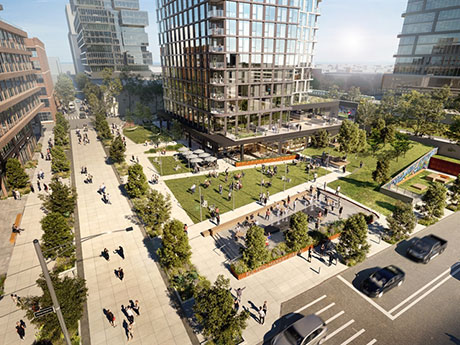By Dougal Jeppe, Colliers
Over the past few years, we have been inundated with less than positive industry news. While it’s true we are at a historic moment in commercial real estate, and users are facing complex, never-before-seen questions about how to use their space, there remain many positives as we head toward the second half of 2024. So, let’s take a look at the good news from the Chicago office market.
For now, downtown Chicago remains a tenant’s market, a trend expected to persist throughout 2024. With over 47.2 million square feet of office space available, tenants have a plethora of high-quality options to choose from, making it an opportune time for businesses seeking favorable lease terms to secure space.

And companies are doing just that. There has been a recent uptick in large space renewals by long-term office tenants including some consolidations reflecting the commitments many Fortune 500 companies, such as Mesirow and PNC Bank, have made to the City of Chicago.
Notably, JPMorgan Chase announced plans to reinvest in Chicago by renovating its namesake tower and keeping its 7,200 employees in the city. Similarly, Google has committed to the Central Loop, and plans to move about 1,000 employees into the former Thompson Center in 2026. It is hoped that the commitments from these major corporations will reinvigorate the submarket.
The flight to quality continues and now includes tenants taking the best spaces with high-rise views — and they are paying for these scarce spaces (total availability of high-rise floors (25th floor or higher) in new builds is only 6.49 percent). The cost of the best skyline view in the newest state-of-the-art offices is on average over 20 percent higher than the central business district (CBD) Class A average gross asking rates.
Other notable trends continue too. Sublease space, which was at an all-time high in the second quarter of 2023, has decreased for the last three quarters. A significant number of these spaces just “disappeared” from the market. In many cases, the term in which the sublease was offered has expired and subsequently absorbed by the landlord who can now offer it as direct space.
Deals, sales get done
In the first quarter of 2024, approximately 155 office lease deals were signed in the CBD and, for the first time in several years, there was a significant mix of both Class A and B lease signings. As of May 2024, there were 196 active tenants touring for just over 9.5 million square feet. Since 2021, touring activity increased by just 600,000 square feet as a significant number of tenants looking for office space decided to consolidate and renew.
Office building sales have also picked up with six notable office buildings over 50,000 square feet (with an average square footage of 280,000 square feet) sold so far this year. In most cases, buyers acquired properties at well below replacement value and many of those buildings that may have not been able to fund deals are now able to secure tenants.
Construction in the city
Construction pricing in Chicago has generally stabilized with general contractors competing more for projects and sharpening their pencils. According to the Mortensen Construction Index, costs increased by only 0.34 percent nationally for the first quarter of 2024, a 1.9 percent increase over the previous 12 months. In Chicago, costs were flat in the most recent quarter and increased only 2.4 percent over the last 12 months. After 12 quarters of continuous cost increases, this is welcome news for the office market.
While construction costs are rising slightly nationwide, there are significant variations between major cities. According to a report from Currie Brown, construction costs in Chicago are predicted to increase by 3.5 percent in 2024, while in Phoenix, these costs are expected to surge by 6 percent. Consequently, a $10 million project built in Phoenix in 2023 will cost $10.6 million this year, whereas the same project in Chicago will cost $10.35 million.
Other good news for Chicago
Chicago is set to host the Democratic National Convention (DNC) in August this year, bringing substantial economic benefits to both the city and the state of Illinois. The event is projected to generate around $200 million in economic impact, creating jobs, driving growth and highlighting Chicago’s world-class hospitality and attractions. With an estimated 50,000 visitors, the DNC will showcase the city at its best during the vibrant summer months.
With a GDP of $836 billion, Chicago’s economy ranks third among U.S. metropolitan areas and is among the top 25 global economies. On March 1, 2024, Chicagoland secured its 11th consecutive title as the “Top Metro in the U.S. for Corporate Relocation and Site Selection,” demonstrating significant economic resilience amidst uncertainties. In 2023, 163 pro-Chicagoland decisions resulted in the creation of 23,100 jobs and generated over $1.87 billion in earnings.
With all these positive data points, it’s hard not to be optimistic about Chicago’s future. Just ask Caleb Williams.
Dougal Jeppe is an executive vice president, office advisory group, with Colliers. This article originally appeared in the June 2024 issue of Heartland Real Estate Business magazine.


